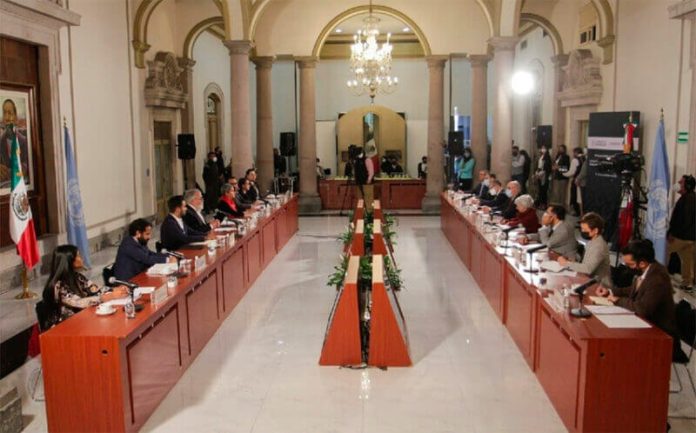The United Nations Committee on Enforced Disappearances (CED) has begun a 12-day “historic visit” to Mexico during which it will assess the country’s capacity to respond to the missing persons crisis in which more than 94,000 people have disappeared.
Headed by Peruvian lawyer Carmen Rosa Villa Quintana, the committee is made up of a group of experts who monitor the implementation of the International Convention for the Protection of All Persons from Enforced Disappearance, to which Mexico is party.
The CED has been seeking to come to Mexico since 2013 but the previous federal government rejected its requests to visit despite pleas by victims’ family members that it be allowed to enter the country.
“This is a historic visit, requested since 2013,” Villa said Monday during an event with federal officials.
The CED is slated to visit 12 states and meet with municipal and state officials, relatives of missing people, civil society representatives and National Human Rights Commission officials, among others.
The U.N. experts will also attend exhumations carried out by authorities and victims’ families, accompany search brigades on missions to locate missing people and visit prisons to examine their registration systems.
Villa said her team has two main objectives: to help Mexico prevent enforced disappearances and to contribute to the fight against impunity.
Mexico has extremely high impunity rates for numerous crimes, including abductions and homicides. In addition, due to a lack of forensic experts and money, authorities have struggled to keep up with the immense task of identifying the bodies of victims of crime.
According to data disseminated by Movimiento por Nuestros Desaparecidos (Movement for Our Missing People), a non-governmental organization, there are more than 52,000 unidentified bodies in morgues.
Speaking at Monday’s event, Deputy Interior Minister for Human Rights Alejandro Encinas acknowledged that the federal government has a missing persons “crisis” on its hands.
“It was at the beginning of this government that the state opened itself up to international scrutiny and supervision and recognized the crisis of the disappearance of people that today adds up to more than 94,000 missing people,” he said.
“This is the most painful legacy the government of Mexico faces and one in which we have to make the greatest effort … to overcome [it],” said Encinas, who has previously described Mexico as an “enormous hidden grave.”
“I want this visit to be beneficial, for it to have good results,” the deputy minister said, explaining that the government is open to hearing the CED’s recommendations.
“… The success of your mission will imply the success of the policies we are implementing. We’re willing to open the doors to the entire federal government so that you can fulfill your mission,” he added.
The CED is scheduled to hold a press conference on the final day of its visit to Mexico – November 26, and will publish a report on its findings next March.
